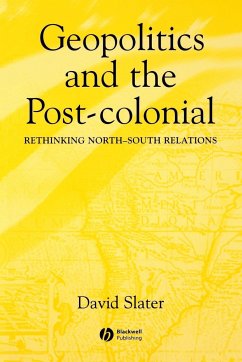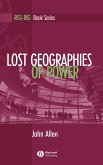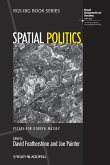Highlighting the contribution of key thinkers from the Third World, Geopolitics and the Post-colonial examines the dynamic nature of spatial power and cultural representation. This book is unique in the way it reconceptualizes geopolitical analysis from a post-colonial perspective. A key motif concerns tracing the historical impact of the United States on the societies of the South and especially the Latin South. Throughout the text, ideas and events, interventions and representations are woven together in a critique of the effects of Western power.
Hinweis: Dieser Artikel kann nur an eine deutsche Lieferadresse ausgeliefert werden.
Hinweis: Dieser Artikel kann nur an eine deutsche Lieferadresse ausgeliefert werden.
"...stimulating, and replete with insights....no serious scholar ofinternational relations can afford to miss it."
Political Science Quarterly
"This book's innovations include its systematic engagementwith the works of Third World intellectuals, its rigorousconceptualization of Euro-Americanism, and a creative recovery ofGramscian Marxism; these features help to ground a very powerfulframework for the post-colonial. This book is the product of atremendous intellectual maturity and sophistication ... theauthor engages and reworks, with great mastery and success, thebest theories of our time."
Arturo Escobar, University of NorthCarolina
"This singular text challenges the "common sense"view of contemporary world power in an eminently sensible andsensitive manner. Written with admirable and unfashionable clarity... it provides a constantly suggestive tour d'horizonof the state of global geopolitics at the start of themillennium."
James Dunkerley, Institute of LatinAmerican Studies, University ofLondon
"This book is part of the best tradition of research which,particularly since the 1990s, has been showing that a properunderstanding of the world is necessarily much larger than aWestern understanding of the world ... Slater formulates a newcritical theory that is adequate to the realities and possibilitiescreated by the global times in which we live, and fully capable ofaccounting for the metamorphoses of the growing inequalitiesbetween North and South."
Boaventura de Sousa Santos, University of Coimbra and Universityof Wisconsin-Madison
"... the book has many positive aspects to be stressed.It is especially strong on the history and present condition ofAmerican imperial hegemony and clearly draws on a wide and detailedknowledge of the Latin American scene." Progress in DeveopmentStudies
"Geopolitics and the Post-Colonial is a richcontribution to the analysis of the imperialist geopolitics ofNorth-South relations inherent in contemporary processes ofpolitical and economic globalization."
Annals of the Association of American Geographers
"It is specifically the reflexive and open-minded way in whichSlater analyses post-colonial thinking in relation to geopoliticsthat makes this a very inspiring work."
Development and Change
"Provoking, timely and delivered with panache."
Gareth A. Jones, London School of Economics and PoliticalScience
"A valuable addition to the study of Chilean politicsafter authoritarian rule, analyzing some of the most importantfactors explaining the trajectory from a brutal militarydictatorship to a stable and rather prosperous democraticregime."
Javier A. Couso, Universidad Diego Portales
Political Science Quarterly
"This book's innovations include its systematic engagementwith the works of Third World intellectuals, its rigorousconceptualization of Euro-Americanism, and a creative recovery ofGramscian Marxism; these features help to ground a very powerfulframework for the post-colonial. This book is the product of atremendous intellectual maturity and sophistication ... theauthor engages and reworks, with great mastery and success, thebest theories of our time."
Arturo Escobar, University of NorthCarolina
"This singular text challenges the "common sense"view of contemporary world power in an eminently sensible andsensitive manner. Written with admirable and unfashionable clarity... it provides a constantly suggestive tour d'horizonof the state of global geopolitics at the start of themillennium."
James Dunkerley, Institute of LatinAmerican Studies, University ofLondon
"This book is part of the best tradition of research which,particularly since the 1990s, has been showing that a properunderstanding of the world is necessarily much larger than aWestern understanding of the world ... Slater formulates a newcritical theory that is adequate to the realities and possibilitiescreated by the global times in which we live, and fully capable ofaccounting for the metamorphoses of the growing inequalitiesbetween North and South."
Boaventura de Sousa Santos, University of Coimbra and Universityof Wisconsin-Madison
"... the book has many positive aspects to be stressed.It is especially strong on the history and present condition ofAmerican imperial hegemony and clearly draws on a wide and detailedknowledge of the Latin American scene." Progress in DeveopmentStudies
"Geopolitics and the Post-Colonial is a richcontribution to the analysis of the imperialist geopolitics ofNorth-South relations inherent in contemporary processes ofpolitical and economic globalization."
Annals of the Association of American Geographers
"It is specifically the reflexive and open-minded way in whichSlater analyses post-colonial thinking in relation to geopoliticsthat makes this a very inspiring work."
Development and Change
"Provoking, timely and delivered with panache."
Gareth A. Jones, London School of Economics and PoliticalScience
"A valuable addition to the study of Chilean politicsafter authoritarian rule, analyzing some of the most importantfactors explaining the trajectory from a brutal militarydictatorship to a stable and rather prosperous democraticregime."
Javier A. Couso, Universidad Diego Portales








